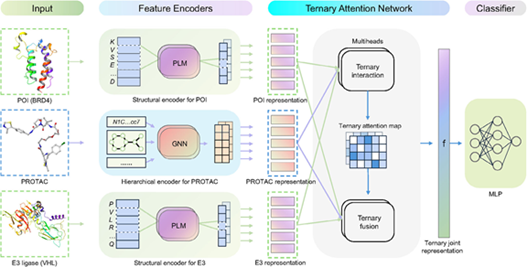Macao Polytechnic University Research Team Develops PROTAC-STAN, Empowering Drug Development for "Undruggable" Targets
Macao Polytechnic University Research Team Develops PROTAC-STAN, Empowering Drug Development for "Undruggable" Targets
The research team led by Prof. Huanxiang Liu and Prof. Xiaojun Yao from Macao Polytechnic University (MPU), in collaboration with Zhejiang University, The Chinese University of Hong Kong, and Lanzhou University, has developed PROTAC-STAN—an innovative and interpretable method for predicting PROTAC degradation activity. This novel approach, which integrates hierarchical encoding, structure-informed encoding, and a deep ternary attention network, brings new hope for tackling "undruggable" targets.

PROteolysis Targeting Chimeras (PROTAC) technology represents a cutting-edge frontier in new drug development. It leverages the ubiquitin-proteasome system to selectively degrade disease-related proteins, enabling precise targeting of traditionally "undruggable" targets. However, the development of PROTAC molecules heavily relies on time-consuming and costly wet-lab experiments, and their complex molecular structures and mechanisms pose significant challenges for rational design. Existing deep learning-based methods for predicting PROTAC degradation activity often overlook the importance of multi-level molecular information and protein structural data, limiting predictive performance and lacking interpretability, which hinders insights into key substructure interactions within the PROTAC system.
To address these core challenges, this study introduces PROTAC-STAN, an innovative framework that combines hierarchical molecular representation of PROTACs, structure-informed encoding for target proteins and E3 ligases, and a ternary attention network to construct an interpretable, deep learning-based model for predicting PROTAC degradation activity. This method not only significantly enhances predictive performance but also generates visualizations at the atomic and residue levels, intuitively revealing the key components that drive the protein degradation process. The exceptional performance of PROTAC-STAN positions it to become a foundational tool in future PROTAC-related drug research, thereby accelerating the development of targeted protein degradation therapies.
The research findings, entitled "Interpretable PROTAC Degradation Prediction With Structure-Informed Deep Ternary Attention Framework," have been published in the internationally renowned academic journal Advanced Science, offering new avenues for conquering "undruggable" targets.
Advanced Science is a prestigious international multidisciplinary journal published by Wiley-VCH Verlag, dedicated to publishing top-tier innovative scientific achievements and cutting-edge advances. It covers a broad range of scientific fields including materials science, physics, chemistry, medicine, life sciences, and engineering. The journal is ranked in the Q1 of both the Chinese Academy of Sciences (CAS) and Journal Citation Reports (JCR), placing it within the top 10% of journals in multiple disciplines, with a 5-Year Impact Factor (2020-2024) of 15.6.
This research was supported by the Macao Science and Technology Development Fund (Grant No. 0030/2024/RIA1). The full text of the study is available at: DOI: 10.1002/advs.202508138.



